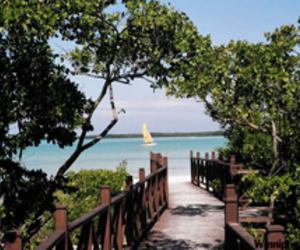We can learn something from Cuba's food-producing culture
- Submitted by: manso
- Society
- 05 / 16 / 2011

Published Monday May 16th, 2011. In popular culture, a Forrest Gump moment happens when a person unwittingly experiences a historic event. The term originates from the movie Forrest Gump, in which Tom Hanks plays a simple, wholesome character with a knack for finding himself in the middle of major news events.
Early in my career, I was fortunate to have had a major Forrest Gump Moment - or perhaps a Forrest Gump half-decade. It offers a lesson that, two decades later, seems more relevant than ever.
Cuba in transition
My Forrest Gump event took place in Cuba during a period of great transition for the island nation. From 1988 to 1993, my work regularly took me to Havana. When the Soviet bloc collapsed in 1989, Cuba's long standing supply of artificially cheap Russian oil was abruptly cut, and the effects were deep and brutal. Without its subsidized energy, Cuba's economy shrunk by more than 30 per cent, causing great hardship for the population. Power failures became daily occurrences. Gas stations rarely had fuel. Food production crashed. The government called it the "special period in peace time," and strict rationing was imposed. It was troubling to see my contacts growing noticeably thinner from one visit to the next.
Autoconsumption
Then, on one visit, I noticed something new in Havana: gardens were everywhere. Patches of vegetables had displaced lawns, even in front of public buildings, and filled virtually every vacant lot. "Autoconsumption," my contacts called it: a government-supported effort to help people become more self-sufficient in food. The vegetables grown near public buildings were used in the cafeterias of those buildings. Vermicomposting, in which earthworms are used to turn organic scraps into plant food, became common.
It was a change borne of necessity: Cuba had no fuel for tractors, no fertilizer and no chemical pesticides.
Autoconsumption, today
Fast forward two decades, and the legacy of Autoconsumption is impressive. Havana, a city of more than two million, is estimated to have more than 30,000 hectares of urban gardens. That's about one and a half times the annual area of New Brunswick's largest food crop, potatoes. From those plots come enough produce to supply over half of that city's needs. Most of it is organic, all of it is fresh. Most is traded, sold and consumed within metres of where it is grown, so it requires no carbon-based transportation.
Food production has become part of Havana's urban culture. The desperation of the early '90s has eased, but urban gardens are more prominent than ever. They form an important part of the food supply as well as an important part of the local economy, employing thousands. Critically, they have also given Cubans vital food production skills and capacity.
A lesson for us?
In this land of plenty, we're lucky. Our supermarkets have always been well stocked, the gas stations always have gas and the power rarely fails.
Unfortunately, that means most of us have come to take everything for granted. Many of us have lost touch with where our food comes from and what it contains. A "special period in peace time" similar to Cuba's would be very stressful for anyone who has never grown an ounce of food.
But beneath all those lawns of ours that require water, fertilizer and mowing lies topsoil, that miraculous material that can turn a seed into a meal. If you've never grown food before, why not make this the spring you turn over some turf and start a garden? You'll be amazed at what you can grow in a small space with a bit of sunlight and moisture. If you live in an apartment, talk to your landlord or inquire if there is a community garden nearby where you can reserve a plot. You can find lots of support and advice online, at your local library, at a garden centre or from a neighbourhood green thumb.
It took an intensely challenging period to make Cuba a leader in producing vast quantities of its food organically in urban gardens, but the net result today is healthier food, healthier people and a healthier planet. We've had no similar Forrest Gump moment here, but perhaps there is something for us to learn from Cuba's experience.
By: Carl Duivenvoorden www.changeyourcorner.com is a speaker, writer and green consultant living in Upper Kingsclear. His column runs every other Monday.
Source: http://telegraphjournal.canadaeast.com/magazine/article/1406611
Comments